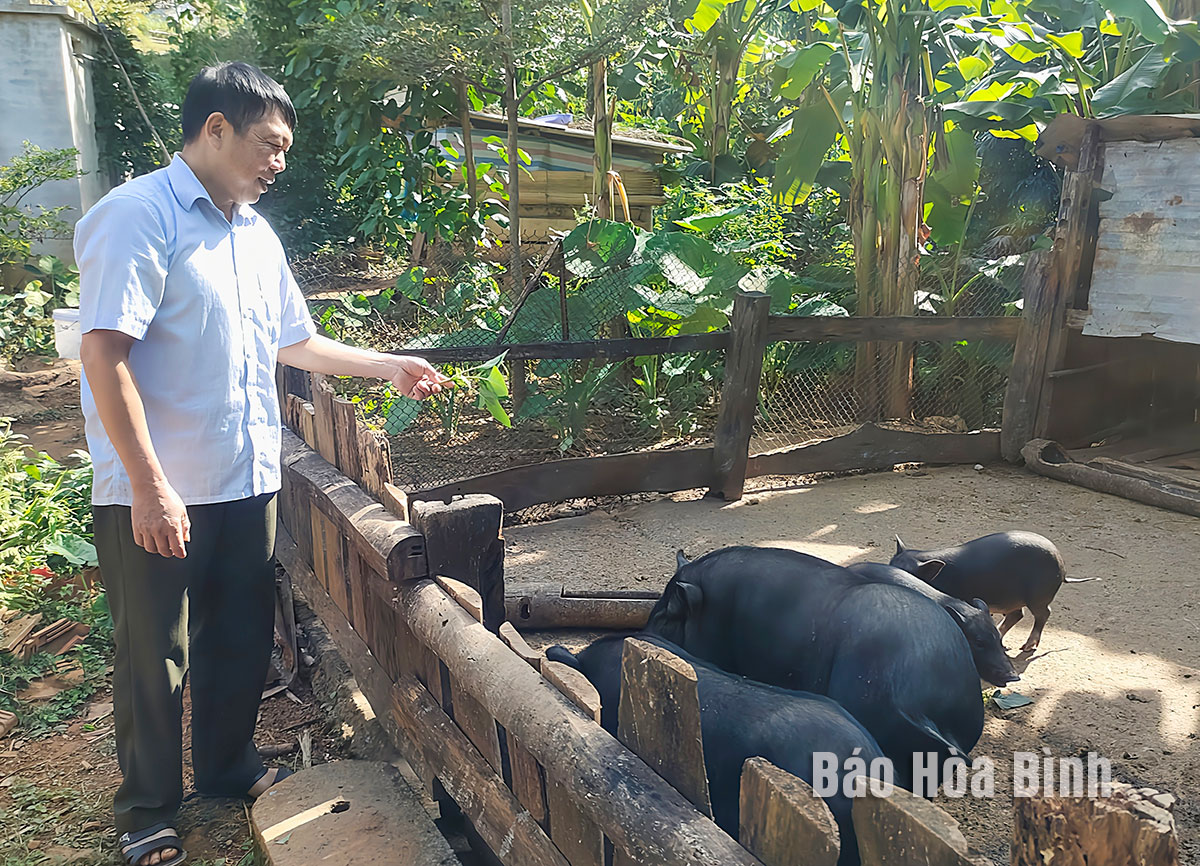



Muog people in Rom Khanh hamlet, Thach Yen commune (Cao Phong), have been raising indigenous black pigs, which has brought them a decent income.
With the advantage of having abundant feed sources and vast grazing areas in the mountainous regions, the people in the highlands of Da Bac, the farmers have shifted from raising these pigs for self-sufficiency to raising them in larger numbers for commercial purposes in recent years. Ms. Lo Thi Tam’s family (Tay ethnic group) has over 1 hectare of forested hills. In the past, her family combined forest planting with raising buffaloes and cows. However, with the sharp decline in buffalo and cow prices, the family decided to invest in building a farm to raise black pigs over a year ago.
After more than a year, the black pigs have brought tthe angible economic benefits to her family. Ms. Tam says that although black pigs grow slowly, reaching only about 20-30 kg in a year, they are cost-effective to raise. Compared to white pigs, black pigs are easier to sell, especially during holidays, as traders come directly to the house to buy them.
Next to Doan Ket commune is Tân Minh commune, where the black pig breeding is also booming. In the past, Ms. Luong Thi Lam’s family, in Enh hamlet, Tan Minh commune, had also raised buffaloes and cows for many years. However, the low sale prices meant the economic value was not high. On the other hand, indigenous black pigs are easier to sell with higher prices, and the raising cost is lower, so Ms. Lam’s family shifted to raising this breed. According to Ms. Lam, the stable market and high prices for black pigs have significantly improved her family’s income.
Besides Ms. Lam’s family, many households in Tan Minh commune are focusing on raising indigenous black pigs. Especially since the establishment of Tan Cuong multi-sector cooperative, the households have been working together in both production and product distribution. Nowadays, Tan Minh pork is packaged with the traceable origin labels, and it has been recognized as a 3-star OCOP (One Commune One Product) product. According to the Department of Agriculture and Rural Development of Đa Bac district, about 3,000 households in the district are currently raising indigenous pigs. The district has been implementing the policies to support indigenous pig breeding, such as funding for piglets and various programs.
In the highland communes of Tan Lac district, Muong ethnic people are also focusing on raising indigenous pigs. This is identified as one of the key factors in making this region a provincial-level tourism destination by 2030. In Ngo Luong commune, where the total pig population is over 1,200 breeds, 70% are the indigenous breeds. Mr. Bui Van Yen, a veterinarian in Ngo Luong commune, shared that indigenous pigs have good resistance to diseases, making them well-suited to the local natural conditions. Even when pig prices drop, the prices for indigenous black pigs remain relatively stable.
In addition to pig farming, other indigenous livestock breeds are also being developed across the province. There is a focus on creating the collective trademarks for the advantageous local breeds. So far, several livestock products have been granted collective trademark certificates, including Lac Son chickens, Lac Thuy chickens, Đa Bac indigenous pigs, Luong Son mountain goats, and Lac Thuy goats.
According to the leadership of the Provincial Department of Livestock and Veterinary Medicine, the authorities are currently drafting a comprehensive proposal for the development of the indigenous livestock. This is considered a key direction for the sustainable livestock development in the province in the coming years, contributing to helping the ethnic minorities effectively utilize their potential and advantages to improve and increase their income through livestock farming.